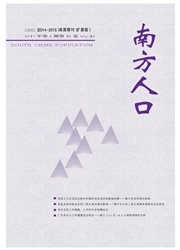

 中文摘要:
中文摘要:
本文利用2006年中国综合社会调查数据(CGSS),对中国过去几十年婚姻市场的匹配情况进行了分析,并实证分析了年龄、学历、家庭背景三种婚姻匹配模式对我国居民婚后生活幸福感的影响。结果表明:(1)我国婚姻市场的婚配模式在年龄、学历和家庭背景方面存在“男高女低”的婚姻梯度现象。但随着时间推移,男女之间的这种梯度差距在逐渐缩小,特别是在学历和家庭背景方面体现的十分明显;(2)在年龄、学历和家庭背景三种婚配模式中,夫妻的年龄差异对男性和女性的婚后幸福感没有显著影响,学历差异会同时影响男性和女性的婚后幸福感.而家庭背景差异仅对女性的婚后幸福感有影响;(3)家庭背景方面,女性在嫁给一个家庭背景好于自己的丈夫时,其生活幸福感会明显提升,但这种效果更多地存在于农村。对城市女性而言,家庭背景的差异对她们的幸福感没有显著影响。
 英文摘要:
英文摘要:
This paper analyzes the marriage matching in the past decades in China based on the data from Chinese General Social Survey (CGSS) in 2006. The impacts of the matching by age, education and family backgrounds in the marriages on the marriage happiness are evaluated by applying micro-econometric analysis. The results show that: Firstly, the dominant mode of the marriage is a matching of high male to lowfemale in terms of age, education and family background while the matching gap in the marriage tend to shrink over time, especially that of education and family background; Secondly the age difference in marriage matching has no significant effect on the happiness of husband and wife, and the difference in education of spouses significantly affects both the marriage happiness of the couples while the differences in family background only affect the happiness of wives; Thirdly, the life happiness of wives gererally is higher for the rural women who married to the man with better family ground while this effect not siginificantly exist for the urban women.
 同期刊论文项目
同期刊论文项目
 同项目期刊论文
同项目期刊论文
 期刊信息
期刊信息
